八年级英语上册感叹句用法外研版.
英语感叹句使用方法

英语感叹句使用方法英语感叹句使用方法(精选2篇)背诵英语课文要掌握一定的技巧,如果死记硬背的话不仅难记住,而且即使记住了也很容易忘记。
所以快速背诵,首先,利用各种途径先掌握大概的意思,下面给大家分享英语感叹句使用方法,希望能够帮助大家!英语感叹句使用方法(篇1)第一招:“一找、二断、三辨、四确定”。
“一找”即找出句中的主语;“二断”是在句中的名词(形容词、副词等)与代词(或名词)之间断开;“三辨”是辨别断线前面的词的词性;第四步可迅速确定如果是名词就选what。
以上方法适用于填空题形式,只要掌握这个方法,复杂的填空题也会迎刃而解。
不过考生要注意,如果断开后,断线前的那个中心词是单数可数名词,别忘了在感叹词与名词间加冠词a(an)。
第二招:“断、找、去、添、改”五步法。
断,就是在陈述句中的谓语动词后将句子断开,如The picture is|very beautiful。
找,就是找出断线后的中心词是何词类。
去,就是中心词是形容词或副词时,要把修饰该形容词或副词的词去掉。
如本句中心词beautiful是形容词,修饰该词的是very,应去掉very。
但要注意,线后如果是名词,名词前的修饰语是不能去掉的。
添,就是添上感叹词。
如果线后的中心词是名词就添What,是形容词或副词就添How。
改,就是将陈述句句前的大写改为小写,将变为感叹句的感叹词及其修饰的名词部分放在句首,感叹词首写字母改为大写,同时句尾的标点由陈述句的句号改为感叹句的感叹号。
因此,例句就变成了:How beautiful the picture is!第三招:“一断、二加、三换位”。
“一断”,就是在谓语动词后将此句划断。
“二加”,就是在第二部分前加引起感叹句的What或How。
中心词为名词时加What,为形容词、副词时加How。
“三换位”就是将第一部分与第二部分对换位置。
第四招:句型记忆法。
因what和how的词性及其在句中的功能不同,由它们引起的感叹句句型可归纳为7种。
(完整word版)八年级感叹句的用法
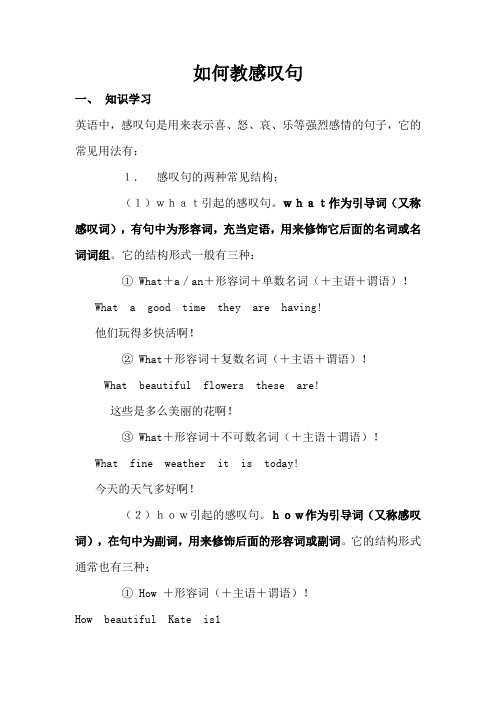
如何教感叹句一、知识学习英语中,感叹句是用来表示喜、怒、哀、乐等强烈感情的句子,它的常见用法有:1.感叹句的两种常见结构:(1)what引起的感叹句。
what作为引导词(又称感叹词),有句中为形容词,充当定语,用来修饰它后面的名词或名词词组。
它的结构形式一般有三种:① What+a/an+形容词+单数名词(+主语+谓语)!What a good time they are having!他们玩得多快活啊!② What+形容词+复数名词(+主语+谓语)!What beautiful flowers these are!这些是多么美丽的花啊!③ What+形容词+不可数名词(+主语+谓语)!What fine weather it is today!今天的天气多好啊!(2)how引起的感叹句。
how作为引导词(又称感叹词),在句中为副词,用来修饰后面的形容词或副词。
它的结构形式通常也有三种:① How +形容词(+主语+谓语)!How beautiful Kate is1凯特长得多漂亮啊!② How +副词(+主语+谓语)!How hard he works!他工作多努力!③ How +主语+谓语(+宾语)How time flies!光阴似箭!二、知识激活用 what或how引导;what修饰名词,而how修饰形容词、副词、动词。
问:那么,什么时候用what,什么时候用 how呢?答:这时要看句子的句型结构以及句子中被强调的是什么词了。
如:1.We had a good time yesterday.(改为感叹句)分析:该句意思为:昨天我们玩得很高兴。
所以感叹句应说:昨天我们玩得多高兴啊!改成:What a good time we had yesterday!2.It's very hot today.(改为感叹句)分析:该句意思为:今天天气很热。
那么,感叹句应说:今天天气多么热啊!改成:How hot it is today!并且还要看到,原来陈述句中的修饰形容词的very已经去掉了。
2013新版外研版英语八年级上册M11 U1

traditions
You mustn‟t ask women‟s age. 不能,禁止
We Chinese eat with chopsticks.
But foreigners eat with knife and fork.
You must help old people. 必须
You mustn‟t pick up flowers in a park. 不能,禁止
/kæ p/ /tʃes/ /set/
(有檐的)帽子 n.
国际象棋 n. (同类事物 的)(一)套,(一) 副,(一)组 n. 一副国际象棋 筷子 n. 玩具 n. (电子)视频的 adj.
cap chess set
a chess set
/'tʃɔp'stIk/ /tɔI / /'vIdiəʊ/
chopstick toy video
mustn‟t mustn‟t
Daming: You
must only use red paper for
hongbao because red means luck. And
you‟d better not have your hair cut
during the Spring Festival month. Tony: You can‟t be serious! 你不是说真的吧! Daming: And in the north of China, people eat lots of Jiaozi! Betty: Great !They taste great. Perfect! Tony: I like eating jiaozi too. Anyway, the Spring Festival is still over a month away. Let‟s celebrate Lingling‟s birthday first!
英语感叹句的结构和用法
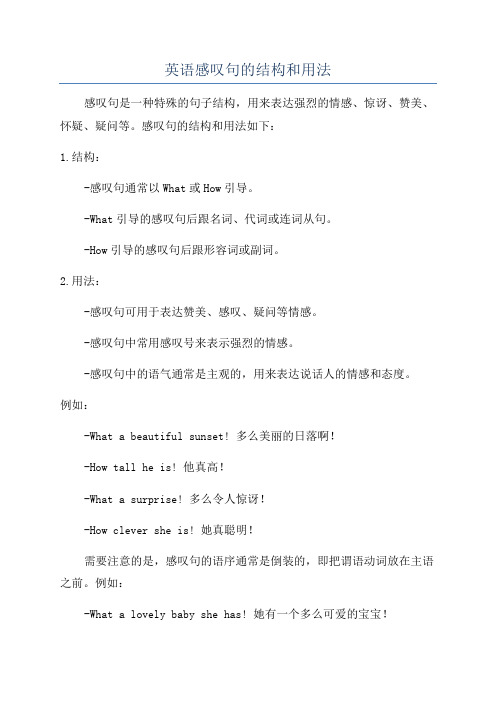
英语感叹句的结构和用法
感叹句是一种特殊的句子结构,用来表达强烈的情感、惊讶、赞美、怀疑、疑问等。
感叹句的结构和用法如下:
1.结构:
-感叹句通常以What或How引导。
-What引导的感叹句后跟名词、代词或连词从句。
-How引导的感叹句后跟形容词或副词。
2.用法:
-感叹句可用于表达赞美、感叹、疑问等情感。
-感叹句中常用感叹号来表示强烈的情感。
-感叹句中的语气通常是主观的,用来表达说话人的情感和态度。
例如:
-What a beautiful sunset! 多么美丽的日落啊!
-How tall he is! 他真高!
-What a surprise! 多么令人惊讶!
-How clever she is! 她真聪明!
需要注意的是,感叹句的语序通常是倒装的,即把谓语动词放在主语之前。
例如:
-What a lovely baby she has! 她有一个多么可爱的宝宝!
-How well he sings! 他唱得多好啊!
此外,还有一些常见的固定句型:
-What a pity! 真可惜!
-How wonderful! 太棒了!
-What a mess! 多么混乱!
-How strange! 多么奇怪!
-What a relief! 真让人松了一口气!
-How amazing! 真是令人惊讶!
总之,感叹句是一种用来表达情感和强调的句子结构,常用于赞美、感慨、惊叹等情境中。
外研版八年级初中英语语法what和how引起的感叹句句型讲解

外研版八年级初中英语语法what和how引起的感叹句句型讲解一、选择题1.―We should learn from the doctors and nurses ________ help to treat the patients in Hubei. ―Yes. ________ brave they are!A.who; What B.which, What C.which, How D.who, How 2."__________ you've made! But you should still work hard, "the teacher said to the boy. A.What great progress B.How a big mistakeC.What a big mistake D.How great progress3.—It's reported that Music and Art will enter the Entrance Examination for the High School.— big news! So it's important for students to learn them well.A.What B.What a C.How D.How a4.--- __________ exciting news it is to have undergrounds in Changzhou soon! Do you know when Metro Line 1 will open?--- _________ the end of 2019.A.How; Until B.What; Not until C.What; Until D.How; Not until 5.________ exciting news it is! We can visit Shanghai Disneyland in a month.A.How B.What C.What a D.What an 6.—Steve, did you eat Beijing Duck during your visit to Beijing?—Sure ! ________ delicious food!A.What a B.How a C.What D.How7.Smart phones are helpful. However,some people use them only for mobile games.__________!A.What a surprise B.What surprise C.What a waste D.What waste 8.-_______________ fine day it is today!-Yes. the sunshine is __________ beautiful that I'd like to go hiking with you.A.How; such B.What a; very C.How; so D.What a; so 9.What _______ fine weather it is!A.a B.an C.the D./10.―________ crowded Changwu Road is!―Yes, because the number of cars has kept ________ greatly since April.A.What a; rising B.How a; raising C.What; raising D.How; rising 11.—________we faced while we were carrying out the task!—Thanks to the volunteers, we could avoid it.A.How big disaster B.How good luckC.What a big disaster D.What good luck12.________ pleasant the journey was! It really opened my eyes.A.How B.What a C.What an D.What13.We should learn from the doctors and nurses_______ help to treat the patients in Hubei._______brave they are!A.who, What B.which, What C.which, How D.who, How14.— _________ crowded Guanqian Street is!— Yes, because the number of people has kept _________ greatly since 1990.A.What; rising B.How a; raising C.What; raising D.How; rising 15.—Notre Dame de Paris(巴黎圣母院) caught fire on April 15,2019.—____________terrible!A.How B.How a C.What D.What a16.______ beautiful the music they are playing sounds! _____ excellent players! A.How, What an B.How, WhatC.What, what D.What, How an17.How ________ the wind ________! I’m afraid he won’t arrive on time.A.terrible; is blowingB.terrible; soundsC.terribly; is soundingD.terribly; blows18.You can't imagine amazing they are you see them with your eyes.A.what; unless B.how; unlessC.how; if D.what; if19._______ wonderful news program we are watching!A.What B.How C.What a D.How a 20.The intelligent car can drive by itself. great invention it is!A.How a B.What a C.What D.How21.— Many people say the temperature in Yangzhou this spring is just like a roller coaster.—I can’t agree more. ________ !A.What a strange weather! B.How a strange weather!C.What changeable weather! D.How changeable weather!22.I found cooking________ great fun. ________ fantastic time we had cooking all kinds of delicious food during the long winter holiday!A.so, What a B.such, How C.so a, What D.such, What a 23.—Look! the man is riding! He leaves other people far behind.—I know him. He is a famous riding-lover.A.How fast B.How slowly C.What fast D.What slowly 24.________ important information you’ve told me!A.What a B.How C.What D.How a25.– Did you watch the NBA game last night? - Yes. _________ amazing the game was! A.What an B.How an C.What D.How26.—________ nice food you’ve cooked for us!—Thank you for coming!A.What B.What a C.How a D.How27.— CGTN covered the launch of the core capsule (核心舱), named Tianhe, into space________.— ________ great moment for our mother country!A.lively; How B.live; What a C.live; How D.lively; What a 28.—Kate won the first prize in the English speech contest.—________ pleasant surprise she has given us! She used to be weak in English.A.How B.How a C.What D.What a29.________ he has provided for us!A.What a useful advice B.What useful suggestionsC.How useful the advice D.How useful suggestions30.— ________ moving person Zhang Dingyu is! He devoted himself to treating and helping patients in Wuhan.—Yes, he won the award for Moving China last year.A.How a B.How C.What a D.What31.—________ excellent work you have done!—It’s very kind of you to say so. It ________ much easier than I thought.A.What; seems B.How; seems C.What an; looks D.How an; looks 32.________ big success the film ________ her novel was!A.What a, based upon B.What, was based onC.What a, was based upon D.How, based on33.So many unusual things happened in 2020. ________ special year it was!A.How B.What C.What a D.What an 34.“The Belt Road (一带一路) has improved the trade between China and other countries.” “So it has. ___ exciting news for people all over the world!”A.How an B.What an C.How D.What35._______hard work it is! And__________should I do to complete it well?A.What a, how B.What, what C.How, what D.What, how36.________ great fun it is to go hiking in __________ weather!A.What, so fine B.How, such a fineC.What, such fine D.How, so fine37.__________ you offered him!A.How useful advice B.What a useful adviceC.How a useful advice D.What useful advice38.—________great fun we had in the park yesterday!—Yes, I will never forget it.A.What a B.What C.How a D.How39.— _______ great progress China has made since 1978!— Yes, its quick development has caught worldwide attention.A.What B.What a C.How D.How a40.— _______ terrible mess you have made!—Sorry, I will tidy it up at once.A.What B.What a C.What an D.How【参考答案】一、选择题1.D【详解】句意:——我们应该向在湖北帮助治疗病人的医生和护士学习。
初中英语知识点归纳感叹句的不同表达方式

初中英语知识点归纳感叹句的不同表达方式感叹句是用来表达惊讶、赞叹、喜悦等情绪的句子。
在英语中,感叹句可以通过不同的表达方式来呈现。
本文将介绍初中英语中感叹句的不同表达方式。
一、What引导的感叹句1. What a + 形容词 + 名词!这种表达方式用于表示赞叹、惊讶或者喜悦的情感。
以下是一些例句:- What a beautiful sunset! 多美的日落啊!- What a lovely baby! 多可爱的宝宝啊!- What a delicious cake! 多好吃的蛋糕啊!2. What + 名词 + 主语 + 动词!这种表达方式用于表示某事或某人的特点或行为引起的惊讶。
以下是一些例句:- What courage she has to face such challenges! 她面对如此挑战的勇气真是令人钦佩!- What a mess you've made in the kitchen! 厨房里乱七八糟的,你弄得真是够呛!- What progress they've made in their studies! 他们在学业上取得的进步真是了不起!二、How引导的感叹句1. How + 形容词/副词 + 连接动词 + 主语!这种表达方式用于表示赞叹、惊叹或者喜悦的情感。
以下是一些例句:- How beautiful the flowers are! 这些花儿多美啊!- How quickly time flies! 时间过得真快!- How well he sings! 他唱得真好!2. How + 形容词 + 名词!这种表达方式用于表示某物的特点引起的惊讶。
以下是一些例句:- How expensive this handbag is! 这个手提包真贵啊!- How delicious the pizza tastes! 这个比萨饼多好吃啊!- How amazing the view is from the top of the mountain! 从山顶上看风景多么惊人啊!三、So/Such引导的感叹句1. So + 形容词/副词 + that + 句子!这种表达方式用于表示某事或某人引起强烈的情感。
外研版8年级上册标点符号默写(含音标和翻译)

外研版8年级上册标点符号默写(含音标和翻译)本文档为外研版8年级上册标点符号默写内容,包含音标和翻译。
以下是各个标点符号的介绍和用法:1. 句号(.)- Period- 用法:表示陈述句的结束。
- 例句:I like to play basketball.- 译文:我喜欢打篮球。
2. 问号(?)- Question Mark- 用法:表示疑问句的结束。
- 例句:What is your name?- 译文:你叫什么名字?3. 感叹号(!)- Exclamation Mark- 用法:表示感叹句的结束。
- 例句:What a beautiful day!- 译文:多美的一天啊!- 用法:用于分隔简单句或列举项。
- 例句:I have a dog, a cat, and a bird.- 译文:我有一只狗,一只猫和一只鸟。
5. 冒号(:)- Colon- 用法:用于引出一个列表、解释或示例。
- 例句:There are four seasons: spring, summer, autumn, and winter.- 译文:一年有四个季节:春天、夏天、秋天和冬天。
6. 分号(;)- Semicolon- 用法:用于连接两个独立但相关的句子。
- 例句:I like to swim; it helps me relax.- 译文:我喜欢游泳;它可以帮助我放松。
7. 引号("")- Quotation Marks- 用法:用于引用直接的对话或引用他人的话。
- 例句:“I love you,” he said.- 译文:“我爱你,”他说道。
请根据以上内容进行默写练习,熟悉各个标点符号的用法和正确书写。
希望对您的学习有所帮助!。
外研版初中八年级英语常用语法知识——感叹句知识点复习(答案解析)

一、选择题1.Will you please________them________the Birdwatching Society?A.inviting; join B.to invite; to join C.invite; to join D.to invite; join C解析:C【解析】【分析】【详解】句意:你能邀请他们加入观鸟协会吗?考查非谓语动词。
invite邀请;join参加,will you please意为“你可以……吗”后面接动词原形,固定搭配invite sb to do sth意为“邀请某人做某事”,故选C。
2.— Mr. Wang, I have trouble __________ the text.— Remember __________ it three times at least.A.to understand;readingB.understanding;to readC.understanding;readingD.to understand;to read B解析:B【解析】【分析】【详解】句意:——王老师,我理解课文有困难。
——记住至少读三遍。
考查固定短语。
understanding动名词形式;reading动名词形式;to understand动词不定式;to read动词不定式。
have trouble (in) doing sth.为固定搭配,意为“做某事有困难”,故第一个空应填入动名词understanding,A、D选项可排除。
remember to do sth.意为“记得去做某事”,remember doing sth.意为“记得做过某事”。
根据句意可知,“读三遍课文”这一动作还未做过,故空格处应用“remember to do sth.”结构,故选B。
【点睛】have trouble (in) doing sth.意为“做某事有困难”,后常接动名词作宾语,其中in可以省略。
外研版英语八年级上册所有知识点总结

• 15.all the time 一直
Module1——重点句型
• 一、提建议的句子: • 1.You(We) should do sth • 2.Let’s do sth • 3.Why not do sth • 4.Why don’t you(we) do sth • 5.How(What) about doing
• …for …有什么用
• 4. arrive at 到达(后接小地点) • 15. take…out of… 从…拿
• 5. once or twice 偶尔,一两次
出…
• 6. go off (灯)熄灭,(闹钟)响起 • 16. go across the road=
• 7.remember to do sth 记得去做某事
• 8. in the east of 在……的东部 • 9.be famous for=be known for • 因……而闻名 • 10.such as 比如 • lions of 数百万的 • 12.on the coast 在海滨,在海岸 • 13.be popular for 因…而受欢
• 7. on one’s way to…
• cross the road 过马路
• 在某人去…的路上
• 17. see/watch/hear sb do sth
• 8. run after 追逐,追赶
看见/听见某人做过某事
• 9. stop doing sth 停止做某事 • see/watch/hear sb doing sth • 看见/听见某人正在做某事
Module 8 重点词组
• 1. in time 及时 • 2. fall off… 从…跌落 • 3. pay attention 注意 • 4. pay attention to doing sth
初中英语感叹句的构成与使用技巧知识点
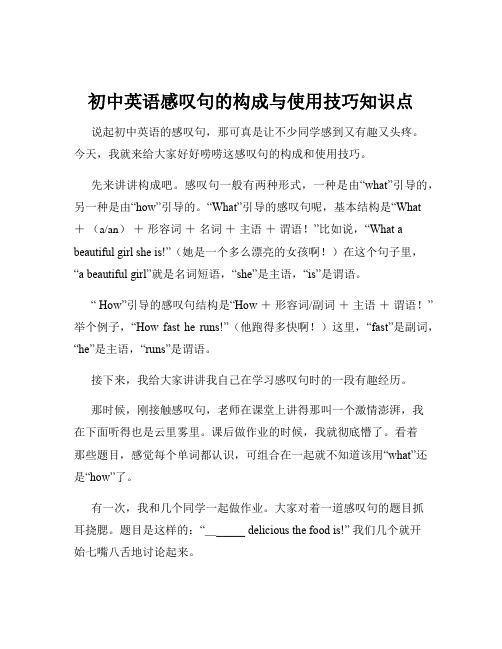
初中英语感叹句的构成与使用技巧知识点说起初中英语的感叹句,那可真是让不少同学感到又有趣又头疼。
今天,我就来给大家好好唠唠这感叹句的构成和使用技巧。
先来讲讲构成吧。
感叹句一般有两种形式,一种是由“what”引导的,另一种是由“how”引导的。
“What”引导的感叹句呢,基本结构是“What+(a/an)+形容词+名词+主语+谓语!”比如说,“What a beautiful girl she is!”(她是一个多么漂亮的女孩啊!)在这个句子里,“a beautiful girl”就是名词短语,“she”是主语,“is”是谓语。
“ How”引导的感叹句结构是“How +形容词/副词+主语+谓语!” 举个例子,“How fast he runs!”(他跑得多快啊!)这里,“fast”是副词,“he”是主语,“runs”是谓语。
接下来,我给大家讲讲我自己在学习感叹句时的一段有趣经历。
那时候,刚接触感叹句,老师在课堂上讲得那叫一个激情澎湃,我在下面听得也是云里雾里。
课后做作业的时候,我就彻底懵了。
看着那些题目,感觉每个单词都认识,可组合在一起就不知道该用“what”还是“how”了。
有一次,我和几个同学一起做作业。
大家对着一道感叹句的题目抓耳挠腮。
题目是这样的:“______ delicious the food is!” 我们几个就开始七嘴八舌地讨论起来。
同学 A 说:“肯定是用‘what’,你看,后面有‘the food’,这是名词啊。
” 同学 B 连忙摇头:“不对不对,应该是‘how’,你看,‘delicious’是形容词,要用‘how’的结构。
” 我在旁边听着,心里也是犹豫不决。
就在我们争论不休的时候,我突然想起老师上课讲的一个例子,好像和这道题有点类似。
我赶紧翻出笔记,仔细看了起来。
看了半天,还是没整明白。
这时候,同学 C 提议:“要不我们一个一个试试?” 于是,我们先写上了“What delicious the food is!” 怎么看怎么别扭。
英语感叹句方法和技巧口诀
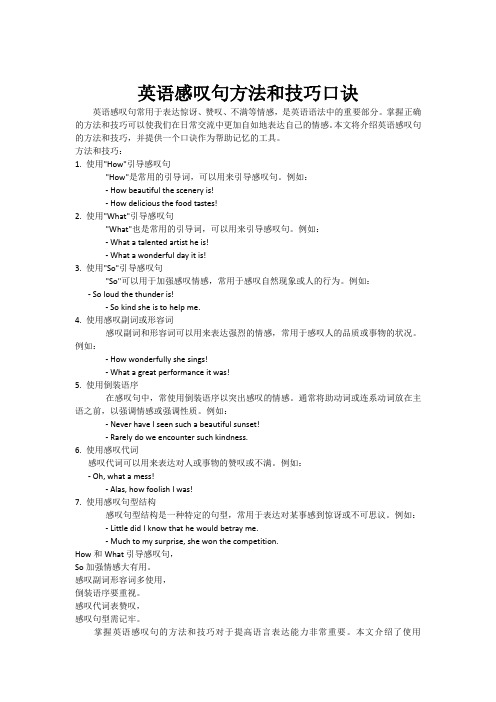
英语感叹句方法和技巧口诀英语感叹句常用于表达惊讶、赞叹、不满等情感,是英语语法中的重要部分。
掌握正确的方法和技巧可以使我们在日常交流中更加自如地表达自己的情感。
本文将介绍英语感叹句的方法和技巧,并提供一个口诀作为帮助记忆的工具。
方法和技巧:1. 使用"How"引导感叹句"How"是常用的引导词,可以用来引导感叹句。
例如:- How beautiful the scenery is!- How delicious the food tastes!2. 使用"What"引导感叹句"What"也是常用的引导词,可以用来引导感叹句。
例如:- What a talented artist he is!- What a wonderful day it is!3. 使用"So"引导感叹句"So"可以用于加强感叹情感,常用于感叹自然现象或人的行为。
例如:- So loud the thunder is!- So kind she is to help me.4. 使用感叹副词或形容词感叹副词和形容词可以用来表达强烈的情感,常用于感叹人的品质或事物的状况。
例如:- How wonderfully she sings!- What a great performance it was!5. 使用倒装语序在感叹句中,常使用倒装语序以突出感叹的情感。
通常将助动词或连系动词放在主语之前,以强调情感或强调性质。
例如:- Never have I seen such a beautiful sunset!- Rarely do we encounter such kindness.6. 使用感叹代词感叹代词可以用来表达对人或事物的赞叹或不满。
例如:- Oh, what a mess!- Alas, how foolish I was!7. 使用感叹句型结构感叹句型结构是一种特定的句型,常用于表达对某事感到惊讶或不可思议。
八年级上册英语感叹词表
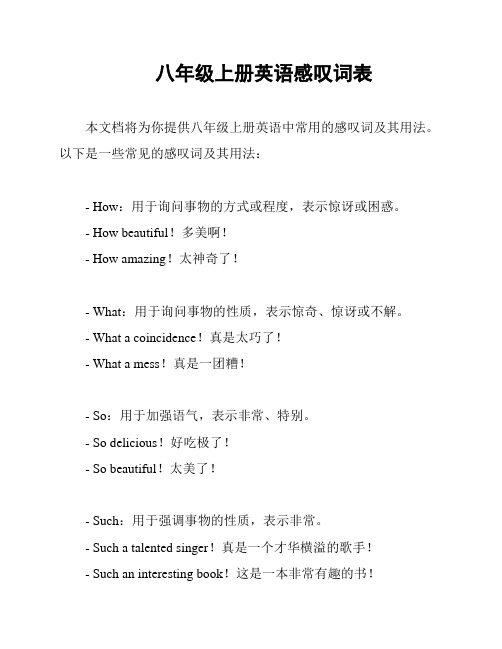
八年级上册英语感叹词表
本文档将为你提供八年级上册英语中常用的感叹词及其用法。
以下是一些常见的感叹词及其用法:
- How:用于询问事物的方式或程度,表示惊讶或困惑。
- How beautiful!多美啊!
- How amazing!太神奇了!
- What:用于询问事物的性质,表示惊奇、惊讶或不解。
- What a coincidence!真是太巧了!
- What a mess!真是一团糟!
- So:用于加强语气,表示非常、特别。
- So delicious!好吃极了!
- So beautiful!太美了!
- Such:用于强调事物的性质,表示非常。
- Such a talented singer!真是一个才华横溢的歌手!
- Such an interesting book!这是一本非常有趣的书!
- Wow:用于表示惊奇、兴奋等强烈的感情。
- Wow, that's incredible!哇,太不可思议了!
- Wow, you did a great job!哇,你做得太棒了!
- Oh:用于表示惊讶、失望、疑问等感情。
- Oh, I see!哦,我懂了!
- Oh, what a shame!哎呀,真可惜!
- Ah:用于表示惊讶、惊奇或顿悟。
- Ah, I get it now!啊,我明白了!
- Ah, that's amazing!啊,太神奇了!
希望这份八年级上册英语感叹词表对你有所帮助!如有任何问题,请随时询问。
外研版八年级英语上册Module 11讲义(含导入及详细知识点)

M o d ule 11.Way of l i fe一、主题:社会行为/风俗(Soc ial behaviour/custo ms)二、必背单词名词:cap(有檐的)帽子 chess国际象棋se t(同类事物的)(一)套,(一)副,(一)组chopst i ck筷子 toy玩具g i f t礼物 di f fe rence 差别;差异t rad i t ion 传统习俗exa mple例子;实例month 月;月份exper ience 经历;经验 s tay逗留;停留 sandwish三明治;夹心面包片ch ip炸土豆条;炸薯条gent l e man 先生;男士 shou lder肩;肩膀动词:accept收受;接受must必须;应该代词:so meone 某人;有人形容词:v ideo(电子)视频的 serious认真严肃地;不开玩笑的副词:im mediat e ly立即;当即介词:onto 到……之上;向……之上兼类词:surpr i se n.惊奇;意外之事 v.使(某人)吃惊tas te v.有……的味道n.味道;滋味三、常用短语1、a chess se t一副国际象棋2、v ideo ga me 电子游戏3、accept a g i f t接受礼物4、in the West在西方5、Chinese t rad i t i ons中国传统6、for exa mple例如7、do so me c leaning 打扫卫生8、have s th. done 让某人做某事9、the Eng l i sh way o f l i fe英国人的生活方式10、for the f i r s t t i m e 首次;初次11、have a f te rnoon tea喝下午茶12、not jus t…but…不仅………而且………13、tea w i th mi lk 奶茶14、f i sh and ch ips炸鱼加炸薯条15、t rad i t iona l food 传统食物16、push one’s way onto the bus挤上公交车17、stand in a l ine 站成一排18、get on the bus上公交车19、not ice sb. do s th.注意到某人做某事20、touch sb. on the shou lder拍某人的肩膀21、at the age of 在……岁22、on the……s ide of the road 在马路的……边四、重点句型1、表示否定转移的句型:I don’t t hink I shou ld open i t now,2、表示吃惊的句型:(1)W hat a su rp r i se!(2)You can’t be ser ious!3、提出建议的句型:(1)And you mustn’t break anyth ing.(2)And you’d better not haveyour ha i r cut dur ing the Spr ing Fes t i va lm o nth.(3)Let’s ce lebrate L ing l ing’s b i r t hday f i r s t!五、模块语法情态动词 must、can 和 need 的用法(You must say Mr or Mrs when you meet so meone for the f i r s t t ime./You can take i t away./ You needn’t wa i t!)M o d ule 11.W a y of l i fe详细笔记1.Here’s your g i f t.这是给你的礼物。
Module+11+Way+of+life 讲义 外研版八年级英语上册

Module 11 Way of lifeUnit 1 In China, we open a gift later.①What a surprise!考点1感叹句的句型e.g. What beautiful girls they are! 她们是多么美丽的女孩啊!How clever the boys are! 多么聪明的男孩们啊!What(+a/an)+ 形容词+ 名词(+ 主语+ 谓语)!How+ 形容词/ 副词(+ 主语+ 谓语)!考点2词性名词动词(及物动词)不可数名词可数名词词义惊讶、惊奇、诧异令人惊奇的事、惊奇、意想不到的事使……惊讶in surprise 惊讶地(常位于动词之后作状语)to one’s surprise 让某人惊讶的是surprise sb. 使某人感到惊讶★常用结构:at sth. 对某事感到惊讶to do sth. 惊讶地做某事surprised 形容词,意为“感到惊讶的”,强调人的主观感受。
surprising 形容词,意为“令人吃惊的”,强调事物自身具有的特征。
语境助记:To my surprise, he wasn’t surprised at all when he heard the surprising news. 令我惊讶的是,听到这个令人吃惊的消息时,他一点都没有感到惊讶。
②But back in the US, we open a gift immediately.考点3immediately/ɪ'miːdiətli/ adv. 立刻;当即e.g. He lay down and fell asleep immediately.他躺下,很快就睡着了。
He called his mother immediately he arrived in Beijing.他一到北京就给他妈妈打了电话。
immediately 还可以作连词,意为“一……就……”,与as soon as 相近。
英语感叹句句型总结

英语感叹句句型总结全文共四篇示例,供读者参考第一篇示例:英语感叹句是一种表示强烈情感或震惊的句子结构,常常用来表达惊喜、愤怒、惊讶等情绪。
感叹句的句型结构相对简单,但却能很好地表达说话者的情感和心情。
下面就来总结一下关于英语感叹句的句型结构。
1. 基本句型在英语中,感叹句的基本句型是:What + a/an + adj + noun + 主语+ 谓语!。
例如:What a beautiful day it is!What an amazing performance they gave!3. 名词的替换有时候,感叹句中的名词可以替换成动词的ing形式或从句。
例如:What an exciting game they are playing!(令人兴奋的比赛)What a kind person she is!(她是个好心人)4. 形容词和副词的使用在感叹句中,常常使用形容词和副词来加强情感的表达。
例如:How beautiful the flowers are!(花儿好美啊!)What a delicious meal we had!(我们吃过好吃的饭)5. 独立主格结构在感叹句中,也可以使用独立主格结构来表达强烈的感情。
例如:Great! You passed the exam.(太好了!你通过了考试。
)6. 省略主语有时候,为了加强感叹句的语气,可以省略句子中的主语。
例如:What a beautiful day!(多美好啊!)What a mess!(多么混乱啊!)英语感叹句句型结构相对简单,但可以通过各种形式的修饰和语气的调整来表达不同程度的情感和情绪。
通过不同的句型结构,我们可以更好地表达自己的感受和态度,使语言更加生动和有趣。
希望以上总结对大家有所帮助,能够在英语表达中更加自如地运用感叹句。
第二篇示例:英语感叹句是在语言交流中常见的一种句型,用来表达说话者的情感、态度或者惊讶等。
英语感叹句通常以感叹词开头,后面跟着主语和谓语,句子末尾常常加上感叹号。
外研版八年级英语语法整理
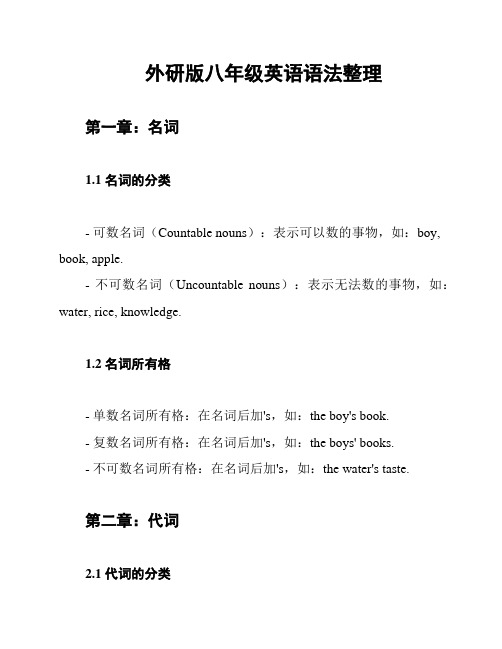
外研版八年级英语语法整理第一章:名词1.1 名词的分类- 可数名词(Countable nouns):表示可以数的事物,如:boy, book, apple.- 不可数名词(Uncountable nouns):表示无法数的事物,如:water, rice, knowledge.1.2 名词所有格- 单数名词所有格:在名词后加's,如:the boy's book.- 复数名词所有格:在名词后加's,如:the boys' books.- 不可数名词所有格:在名词后加's,如:the water's taste.第二章:代词2.1 代词的分类- 人称代词(Personal pronouns):I, you, he, she, it, we, they.- 物主代词(Possessive pronouns):mine, yours, his, hers, its, ours, theirs.- 反身代词(Reflexive pronouns):myself, yourself, himself, herself, itself, ourselves, yourselves, themselves.- 指示代词(Demonstrative pronouns):this, that, these, those.- 不定代词(Indefinite pronouns):some, any, every, each, many, much, few, little.2.2 代词的用法- 主格代词:用作主语,如:He likes apples.- 宾格代词:用作宾语,如:I saw him.- 形容词性物主代词:用于修饰名词,如:This is my book.- 副词性物主代词:用于表示所有关系,如:I put the book on the table.第三章:形容词和副词3.1 形容词的分类- 形容词分为:性质形容词(Qualitative adjectives)和程度形容词(Quantitative adjectives)。
- 1、下载文档前请自行甄别文档内容的完整性,平台不提供额外的编辑、内容补充、找答案等附加服务。
- 2、"仅部分预览"的文档,不可在线预览部分如存在完整性等问题,可反馈申请退款(可完整预览的文档不适用该条件!)。
- 3、如文档侵犯您的权益,请联系客服反馈,我们会尽快为您处理(人工客服工作时间:9:00-18:30)。
感叹句
感叹句是表达喜、怒、哀、乐以及惊奇、惊讶等强烈感情的句子。
感叹句通常由 what 或 how 引导。
现分述如下:
一、由 what 引导的感叹句,其句子结构可分为以下三种:
1. 可用句型:“ What + a/an +形容词+可数名词单数+主语+谓语!”。
如:
What a nice present it is! 它是一件多么好的礼物啊!
What an interesting book it is! 它是一本多么有趣的书啊!
2. 可用句型:“ What +形容词+可数名词复数+主语+谓语!”。
如:
What beautiful flowers they are! 多么漂亮的花啊!
What good children they are! 他们是多么好的孩子啊!
3. 可用句型:“ What +形容词+不可数名词+主语+谓语!”。
如:
What fine weather it is today! 今天天气多好啊!
What important news it is! 多重要的新闻啊!
二、由 how 引导的感叹句,其句子结构也分为三种:
1. 可用句型:“ How +形容词 / 副词+主语+谓语!”。
如:
How careful she is! 她多么细心啊!
How fast he runs! 他跑得多快啊!
2. 可用句型:“ How +形容词+ a/an +可数名词单数+主语+谓语!”。
如:
How beautiful a girl she is! 她是个多么漂亮的姑娘啊!
3. 可用句型:“ How +主语+谓语!”。
如:
How time flies! 光阴似箭!
由 what 引导的感叹句与由 how 引导的感叹句有时可以转换,但句中部分单词的顺序要有所变化。
如:
How beautiful a girl she is! = What a beautiful girl she is!
What delicious cakes these are! = How delicious these cakes are!
三、有时感叹句也可以由一个单词、词组、祈使句、陈述句等构成。
如: Good idea! (好主意!) wonderful! (太精彩了!) Thank goodness! (谢天谢地!)。
